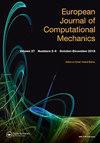Prediction Method of Characteristic Value of Foundation Bearing Capacity Based on Machine Learning Algorithm
IF 0.6
Q3 MECHANICS
引用次数: 1
Abstract
In this paper, a prediction method of characteristic value of foundation bearing capacity based on machine learning algorithm is proposed. Firstly, the influencing factors of foundation bearing capacity are analyzed, and then the prediction parameters of foundation pressure strength and foundation strength are calculated. The prediction error was obtained by comparing the difference between the predicted value and the actual intensity, which was used as the optimization value to improve the accuracy of the prediction results of the characteristic values of the subsequent bearing capacity. Then, by calculating the characteristic parameters of foundation mechanics and establishing the boundary conditions of foundation bearing capacity, the mathematical model of foundation bearing capacity is constructed, so as to complete the analysis of the mechanical characteristics of foundation bearing capacity. The analysis results and foundation strength prediction parameters are input into the RBF neural network model. On the basis of optimizing parameter weights by the improved Relief algorithm, the prediction results of characteristic values of foundation bearing capacity are obtained by using the hyperparameters of THE RBF neural network algorithm. Experimental results show that the prediction results of this method are always in a controllable range, and the prediction error rate is between 1.21% and 1.35%, and the prediction time is between 30.1 min and 32.5 min, indicating that this method has high prediction accuracy and timeliness.基于机器学习算法的地基承载力特征值预测方法
提出了一种基于机器学习算法的地基承载力特征值预测方法。首先分析了影响地基承载力的因素,然后计算了地基压力强度和地基强度的预测参数。通过对比预测值与实际强度的差值得到预测误差,并以此作为优化值,提高后续承载力特征值预测结果的精度。然后,通过计算基础力学特征参数,建立基础承载力的边界条件,构建基础承载力的数学模型,从而完成基础承载力的力学特性分析。将分析结果和地基强度预测参数输入到RBF神经网络模型中。在改进的Relief算法优化参数权重的基础上,利用the RBF神经网络算法的超参数得到地基承载力特征值的预测结果。实验结果表明,该方法的预测结果始终在可控范围内,预测错误率在1.21% ~ 1.35%之间,预测时间在30.1 ~ 32.5 min之间,表明该方法具有较高的预测精度和时效性。
本文章由计算机程序翻译,如有差异,请以英文原文为准。
求助全文
约1分钟内获得全文
求助全文

 求助内容:
求助内容: 应助结果提醒方式:
应助结果提醒方式:


